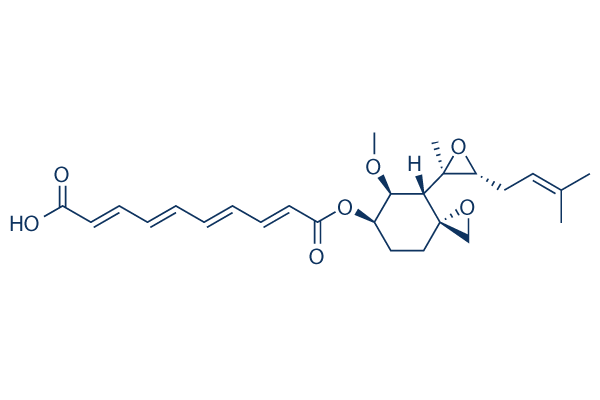All AbMole products are for research use only, cannot be used for human consumption.

In vitro: Fumagillin selectively inhibits the growth of a Δmap1 strain but not a wild-type or a Δmap2 S. cerevisiae strain missing MetAP-2. In budding yeast cells, as a potent inhibitor of angiogenesis, Fumagillin not only reverses the growth inhibitory activity of Vpr, but also inhibits Vpr-dependent viral gene expression upon the infection of human macrophages. Though the toxicity of fumagillin has limited its use for human applications, the analogues using structure-activity relationships relating to its angiogenesis properties may be further explored in the treatment of angiogenesis-dependent diseases. In vivo: In DEN-treated rats, fumagillin (30 mg/kg, i.p.) inhibits both progression of HCC in the liver itself and systemic metastasis.
| Cell Experiment | |
|---|---|
| Cell lines | lymphoma cell lines |
| Preparation method | The transcript and protein product of replication transcriptional activator (RTA) were induced by 1-10 μM fumagillin at 24 and 48 h, respectively. Western blot analysis demonstrated that 10 μM fumagillin induced not only RTA expression but also other KSHV-encoded lytic proteins. A real-time PCR array detecting KSHV gene expression demonstrated that the expression profiles of KSHV induced by fumagillin were similar to those induced by 12-O-tetradecanoylphorbol-13-acetate (TPA), but the amounts of each transcript were lower than those induced by TPA. Finally, real-time PCR demonstrated an increase in that viral DNA copy number per cell in fumagillin-stimulated primary effusion lymphoma cell lines, indicating replication of KSHV. |
| Concentrations | 1-10 μM |
| Incubation time | 48h |
| Animal Experiment | |
|---|---|
| Animal models | |
| Formulation | |
| Dosages | |
| Administration | |
| Molecular Weight | 458.54 |
| Formula | C26H34O7 |
| CAS Number | 23110-15-8 |
| Solubility (25°C) | 72 mg/mL in DMSO |
| Storage |
Powder -20°C 3 years ; 4°C 2 years In solvent -80°C 6 months ; -20°C 1 month |
| Related Antibiotic Products |
|---|
| Puromycin-d3
Puromycin-d3 is the deuterium labeled Puromycin. Puromycin dihydrochloride is the dihydrochloride salt of puromycin. Puromycin is an aminoglycoside antibiotic that inhibits protein synthesis. |
| BSH-IN-1
BSH-IN-1 is a potent and covalent inhibitor of gut bacterial recombinant bile salt hydrolases (BSHs) with IC50s of 108 nM and 427 nM for B. longum BSH (Gram positive) and B. theta BSH (Gram negative), respectively. |
| AAA-10
AAA-10 is an orally active gut bacterial bile salt hydrolases (BSH) inhibitor, with IC50s of 10 nM, 80 nM against B. theta rBSH and B. longum rBSH respectively. |
| Gut restricted-7
Gut restricted-7 (GR-7) is a potent, covalent and orally active pan-bile salt hydrolase (BSH) inhibitor. Gut restricted-7 has a tissue-selective and is restricted to the gut. Gut restricted-7 decreases gut bacterial BSHs and decreases deconjugated bile acid levels in feces of mice. |
| N-Hydroxypipecolic acid
N-Hydroxypipecolic acid (1-Hydroxy-2-piperidinecarboxylic acid), a plant metabolite and a systemic acquired resistance (SAR) regulator, orchestrates SAR establishment in concert with the immune signal salicylic acid. N-Hydroxypipecolic acid accumulates systemically in the plant foliage in response to pathogen attack. N-Hydroxypipecolic acid induces SAR to bacterial and oomycete infection. |
All AbMole products are for research use only, cannot be used for human consumption or veterinary use. We do not provide products or services to individuals. Please comply with the intended use and do not use AbMole products for any other purpose.


Products are for research use only. Not for human use. We do not sell to patients.
© Copyright 2010-2024 AbMole BioScience. All Rights Reserved.
